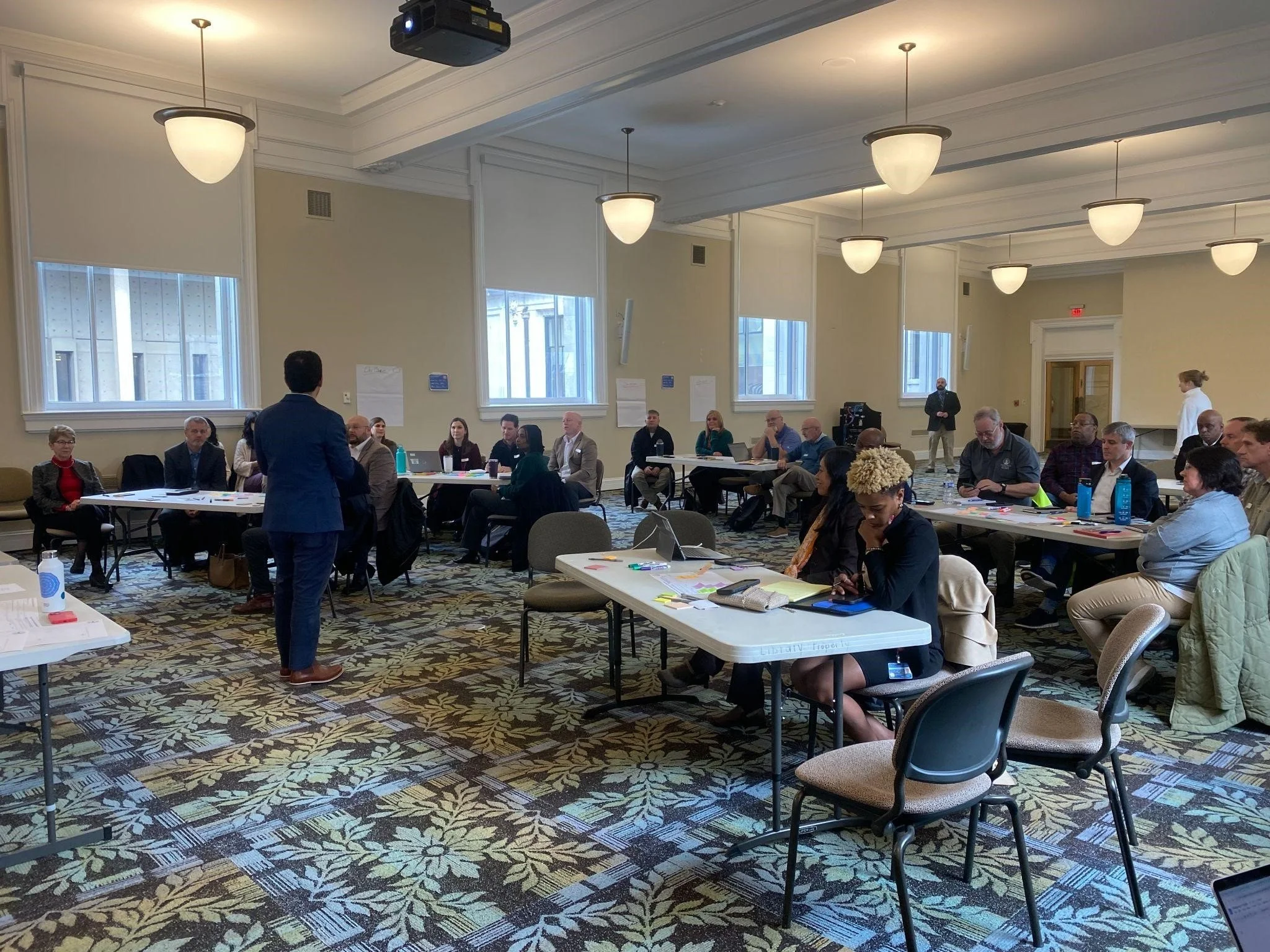Charting a Path for Success
1,577 words in this newsletter - about 6 minutes and 38 seconds to read.
By Victoria Fanibi
A simple equation: Vision + Action + Perseverance = Success. Simple in theory anyway. As practitioners, we’re up against a lot and perhaps we find ourselves struggling how to best propel our efforts forward. In those moments it’s good to reflect on the innumerable ways we’ve outsmarted, outdid, and outmaneuvered the most difficult of challenges to implement equity-driven, and community-focused efforts.
This reflection starts with Camron Bridgford’s breakdown of Cityfi’s collaboration with Miami-Dade County’s Department of Transportation and Public Works (DTPW) to develop a unique strategic plan. Many strategic plans are externally focused touting large, sweeping initiatives. Less attention, however, is paid to the mechanics of delivery - how the agency will work with other departments, the internal talent required, and the process improvements needed to achieve it.
DTPW’s plan is pioneering in emphasizing the internal strategy required to execute community-facing initiatives. Miami is not the only place we have helped navigate process and operational improvements. Karla Peralta describes our work Louisville Metro where we helped direct the restructuring of the city’s transportation sector. These case studies illustrate the importance of aligning internal strategies with broader perspectives and overcoming what we once found insurmountable.
The definition for “success” in a fields like urban planning, mobility, and community development may seem relatively amorphous, but we’re fortunate to witness positive, tangible outcomes for our neighbors and in our own lives. So perhaps success isn’t the “simple” ask of visioning and putting forth action. Rather, it may be the simple act of caring for our communities and wielding the tools we have at our disposal to show this care.
A Case Study on Internal Planning Success: Miami-Dade Department of Transportation and Infrastructure Three-Year Strategic Plan
By Camron Bridgford
In city governments across the country, departments of transportation are grappling with their role in helping to solve the challenges of our times. From stubborn progress on Vision Zero, to growing congestion, to clear impacts on transportation and infrastructure from climate change, cities have put ample work into identifying the most critical programs and projects necessary to optimize the built environment and provide communities with livable, resilient and safe roads and transportation options.
The plans that articulate these actions are no doubt vital, as they provide cities with the necessary roadmaps to meet community-facing commitments and goals, such as clean transportation options, walkable streets, and connected and efficient modes. In fact, Cityfi has supported many cities on such plans, from the City of Minneapolis, to the District Department of Transportation, to the Jacksonville Transportation Authority.
However, Cityfi also knows that any plan is only as good as an agency’s ability to implement it. Without the right capacity, resources, systems, and processes, great projects and plans can be shelved, or staff may struggle to effectively execute. Therefore, with Miami-Dade County’s Department of Transportation and Infrastructure (DTPW), Cityfi recently worked with key leadership to identify a potentially even more critical (albeit, less sexy) planning need: an internally-facing plan to execute on their externally-facing projects and community goals of providing safe, clean, efficient and connected transportation options.
With this in mind, Cityfi developed a unique, first-of-its-kind strategic plan for the department, the DTPW Strategic Plan: A Roadmap for Internal Success. The strategic plan leverages four key goals as its North Stars for what success looks like:
Invest in Our People: create a culture that supports and empowers staff.
Operate with Discipline: Establish consistent processes and procedures that rely on data.
Achieve Operational Excellence: Create a great customer service experience across all modes and supporting infrastructure.
Deliver Results: Deliver projects on time and budget.
Through extensive stakeholder engagement with staff of all levels, Cityfi developed six key priorities to meet these goals, including those related to resource management, operational efficiency, communications, asset management, and performance management. These actions address common transportation and city department challenges such as enhancing human resources practices; addressing procurement barriers; fostering workforce development; standardizing systems; leveraging data to drive strategic decisions; optimizing funding efficiency; and improving customer satisfaction.
With the DTPW Strategic Plan: A Roadmap for Internal Success, the department has driven something seemingly simple but quite extraordinary: acknowledging the need to have your house in order to be able to meet the needs of those in your community. Cityfi hopes that DTPW’s internally-facing strategic plan becomes an example for other departments across the country - transportation and otherwise - looking to improve upon their standards in order to more effectively and efficiently drive progress toward their vision and community goals.
Transforming Transportation in Louisville Metro
By Karla Peralta
We are excited to share our recent collaboration with Louisville Metro, where we assessed the city's transportation sector, identified its critical challenges, and proposed the establishment of the Louisville Metro Transportation Department. Our efforts were in close partnership with Sam Schwartz Engineering and Gifted by Design (GBD), who led local community engagement.
Our approach was rooted in engagement, as we worked with departmental staff, council members, peer agencies, and community organizations to gain an understanding of Louisville’s transportation landscape. By evaluating what was working well and identifying areas for improvement, we were able to pinpoint the necessary organizational changes to enhance the department's efficiency and effectiveness.
Driving Transformation: The Power of Organizational Change
Reorganizing a transportation department is a significant undertaking, but the rewards in the long-term are substantial. By addressing organizational, resource, and operational challenges, the new department is poised to streamline project delivery and ensure that transportation outcomes align with Metro’s priorities and community expectations. Key actions include integrating transportation functions under one department, rebranding and elevating the department’s visibility, and implementing a matrixed management approach to shepherd projects from conception to completion.
One of the most exciting aspects of this project is the commendable commitment of the city’s leadership and staff to embrace these changes. Our work in Louisville Metro underscores the importance of identifying and implementing organizational changes to improve transportation services. By developing and standardizing key processes and continuously evaluating performance, cities can ensure their transportation departments operate at their best. We are proud to have been part of this transformation and look forward to seeing the positive impact on Louisville’s transportation infrastructure and services.
Cityfi remains committed to helping cities navigate and implement changes that lead to more efficient and effective transportation systems. We are inspired by Louisville’s swift action and dedication, and we are excited to continue supporting their journey toward a more connected and efficient transportation future. If you have any questions or want to learn more about this project, reach out!
Accelerating to Zero
By Karina Ricks
Back in April, the Joint Office of Energy and Transportation (JOET) put out an exciting opportunity - the $54 million Communities Taking Charge Accelerator program. The program focused on three critical gaps in the effort to decarbonize the transportation sector: 1) addressing the charging needs of those who lack at-home charging opportunities, 2) promoting the expansion of e-mobility solutions for micro, light-duty, medium-duty, and heavy-duty fleets and 3) facilitating managed charging for reliable energy.
While there is great enthusiasm for the e-mobility transition overall, Cityfi found exuberant enthusiasm for this program, particularly amongst our many partners. The first phase of the program was to submit a brief 5-page concept paper. Cityfi worked with over a dozen different teams to submit concepts. Imagine our surprise when we receive news in June that three-quarters of these concepts were encouraged to submit full proposals for consideration!
The concepts varied widely from equity-focused charging for lower-income multifamily residents to expanded electric bike-share to serve a broader community. We helped build networks of e-charging “Policy Labs” and proposed a strategy to improve regulatory consistency for more emergent e-mobility forms like low-speed vehicles, e-tuktuks, e-cargo tricycles, and quadcycles.
We learned a lot through this process. We learned about the coalitions ready, willing, and able to act and we learned about the questions and queries that remain. Mostly we learned that communities are eager to take charge!
What We’re Reading
Curated by Victoria Fanibi
Articles handpicked by the Cityfi team we have found interesting:
CleanTech: L.A. to Get $77M in Federal Funds to Add Electric Buses Before Olympics
Reimagined Streets: Cyclists are Taking Over Paris for the Olympic Game
Civic Innovation: An affordable housing solution hidden in plain sight: Libraries
Zoning: Single-Family Zoning in California: A Statewide Analysis
Equity: Creating Livable Cities through Inclusive Urban Design
Job Openings
Are you exploring opportunities for your next role? Check out these positions, and contact us at info@cityfi.co to learn more!
Intelligent Transportation Society of America (ITS America)
Mid-Ohio Regional Planning Commission (MORPC)
New York City Department of Transportation
All Things Cityfi
Your guide to our services, portfolio of client engagements, team, and…well, all things Cityfi.




